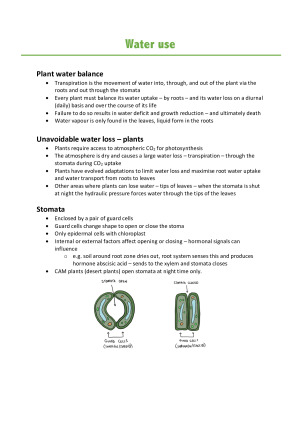H1 (85) Plant growth Processes (AGRI20026)
Subject notes for UniMelb AGRI20026
Description
These notes include hand-drawn images and information about the following content; Growth Analysis • Growth • Plant Development • What is a meristem? • Types of meristems • Measuring plant growth • Phases of plant growth • Factors affecting plant growth and development • Growth rate • Relative Growth Rate • Examples of relative growth rate • Absolute growth rate • Absolute vs Relative growth rate • Driving variables for relative growth rate • Leaf area index • Factors influencing relative growth rate Water use • Plant water balance • Unavoidable water loss – plants • Stomata • Leaf surface structure • Adaptations to life on land – plants • Water potential • Water movement in plants • Osmosis in plant cells • Water potential components • Matric potential • Hydrostatic Pressure • Gravitational potential • Water relations of plant tissue Xylem Transport • Soil-plant-atmosphere continuum (SPAC) • Water in soils • Soil hydraulic conductivity • Apoplast root water uptake • Cell-to-cell movement root water uptake • Aquaporins • Regulation of aquaporins • Xylem pathway • Xylem Tracheid • Xylem Vessel • Xylem water flow – poiseuille’s law • Cavitation (embolism) in xylem • Water pathway leaf-atmosphere Stomatal control of transpiration • Transpiration rate equation • Water vapour concentration • Boundary layer resistance • Stomata • Stomatal opening • Stomatal closure • Stomatal physiology Plant nutrition • What is an essential nutrient? • Macro vs micronutrients • Primary and secondary deficiencies • Functional groups of nutrients • N2 fixation • Critical concentrations • Nutrient availability • Nutrient deficiency • Chlorosis • Examples of nutrient deficiency • symptoms • Mobile nutrients • Immobile nutrients • Bray’s mobility concept • Nutrient toxicities • Interpreting plant symptoms Nutrient uptake by roots • Nutrient Uptake by roots • Nutrient mobility • Forms of potassium in soils • Movement of nutrients in soil • Mass flow • Diffusion • Root interception • Nutrient depletion by roots • Root systems • Movement of solutes into roots • Biomass allocation to roots • Root architecture • Maximising nutrient uptake • Root hairs • Cluster roots (Proteoid roots) • Soil factors effect on root shape • The Rhizosphere • Nitrogen fixation • Formation of N2 fixing nodules • Chelating agents • Active uptake of solutes via roots • Transport proteins • Soil colloid and nutrient exchange Plant resource partitioning • Resource capture • Biomass allocation • Factors affecting biomass allocation – environment • Biomass allocation - Variation between species • Source-sink model • Source-sink model – nutrient examples • Preferential sinks • Growth of cereals – source and sinks • Source and Sink feedback mechanism examples • Carbon partitioning: Harvest index (HI) • Plant response to nutrient shortage Plant development • Plant Development • Development and phenology • Phenostages and phenophases • Why is phenology important? • Zadoks’ scale for cereals • Canola phenology • Aligning canola phenology with environment • Responses of development to environmental factors • Measuring plant development • Thermal time – TT • Developmental switches • Photoperiodic response • Vernalisation • Basic development rate • Maturity types • Dual-purpose wheat • Crop improvement Photosynthesis • Overview of Photosynthesis • Photosynthetic pigments • Chloroplasts • Photosystem 1 and 2 overview • Difference between PSI and PSII • Emerson effect • Z scheme • Cyclic electron flow and the light reaction • Linear Electron Flow and the light reaction • Group C herbicides • Group L herbicides • Chemiosmotic theory • Calvin Cycle • Calvin cycle 3 phases • Rubisco • Rubisco in C3 plants • Photorespiration • C4 Photosynthesis • What are the advantages of C4? • CAM photosynthesis pathway • Conditions for C4 advantage Hormones • Intro to hormones • Role of plant hormones • Classes of plant hormones • Overview of the plant hormones • Concentration of hormones • Antagonism • Plant hormone cross-talk Auxin • Discovery of Auxin • Auxin • Auxin role • Phototropism • Acid growth hypothesis • Auxin transport through the cell • Auxin Herbicides • Auxin secondary growth effects • Major effects of auxins on plant biology Gibberellins • Gibberellins discovery • Effect of gibberellins on dwarf plants • Gibberellins in seeds • Gibberellins and fruit setting • Gibberellin and Abscisic acid • Major effects of Gibberellins on plant biology Cytokinins • Cytokinins discovery • Cytokinins overview • Cytokinins and Auxins • Direct inhibition hypothesis – Apical dominance • Role of Cytokinins • Major effects of Cytokinins on plant biology Abscisic acid • Abscisic Acid discovery • Effects of Abscisic acid • Water stress and ABA • Major effects of Abscisic acid on plant biology Ethylene • Ethylene discovery/overview • Triple response – ethylene • Abscission of leaves • Fruit ripening • Apoptosis – ethylene • Major effects of ethylene on plant biology Brassinosteroids • Brassinosteroids discovery/overview • Role of Brassinosteroids Plant stress – water deficit • Evaporation or transpiration contribution • Pan evaporation method • Changes to Kc • Water deficit significance for plant life • Degree of drought stress • Responses to water deficit • Effects of water deficit • Plant adaptations to water deficit • Plant adaptations Plants and salinity • Salinity • Dryland salinity • Irrigation salinity • Plant responses to salinity • Osmotic and Ionic Stress • Water deficit and ion excess • Halophytes – how they manage salinity • Root anatomy and salt tolerance • Salt tolerance of the shoot • Ion excess in the apoplast • Elevated CO2 and wheat quality
UniMelb
Semester 1, 2020
75 pages
16,150 words
$39.00
12
Campus
UniMelb, Parkville
Member since
February 2018
